- Home
- Donald McCaig
Rhett Butler's People Page 2
Rhett Butler's People Read online
Page 2
John Haynes braced the mahogany box on the carriage fender, unlatched it, and removed a pistol. The sleek knurled butt felt alive in his hand, as if he’d clutched a water moccasin. “As you see, the pistols are identical. While you observe, I’ll charge one pistol. You will charge the second.”
John poured powder, set a round lead ball into an oiled cloth patch, and rammed it home. He placed a cap under the hammer and eased the hammer to half cock.
“They’ll never believe this back home,” Thomas Jaffery said.
The morning gathered light, the fog tore into streamers, and two ghostly vehicles swam into sight across the meadow: a one-horse chaise and a mule-drawn farm wagon.
Rhett Butler untied his horse from behind the carriage and pressed his face against the beast’s powerful neck. “You’re not frightened, are you, Tecumseh? Don’t be. Nothing’s going to hurt you.”
“This meadow, John—they grew indigo here in my grandfather’s day. There’s a pond in the woods where pintails hatch their young. Muskrats are fond of young pintails, and sometimes a brood will be paddling along, until one is pulled under—so swiftly, they don’t make a flurry. Our trunk master, Will, trapped muskrats here.”
“Rhett, we seconds will speak with Watling. What apology will you accept?”
Rhett squeezed his eyes shut obstinately. “Shad Watling claims I am father of his sister’s child. I have said Watling is a liar. If Watling admits his lie, I will withdraw my challenge.”
“Will you offer compensation? Money so the girl can go somewhere to have her baby?”
“If Belle needs money, I will give her money. Money has nothing to do with this.”
“As your friend, Rhett…”
“John, John…” Rhett muffled his face in Tecumseh’s neck. “A friend would help me finish this thing.”
Shadrach Watling’s farm wagon was heaped with broken wheels, hubs, and rims. “Morning, Mr. Jaffery, Mr. Haynes. I see you brung Butler.”
“Shad…”
“It’ll be ‘Mr. Watling’ today.”
“Mr. Watling, I trust we can reach an accommodation.”
“B’lieve Butler ’commodated my sister. B’lieve I’ll ’commodate him.”
“When Rhett Butler treated you as a gentleman, he complimented you.”
Shad spat. “I’m thinkin’ of westering. Goddamn, I’m sick of the Low Country. Rich bastards and niggers. Niggers and rich bastards. I got cousins in Missouri.”
“Wherever you go, you’ll want money. If your sister, Belle, were to go with you, the scandal would die.”
Watling chuckled. “Butler offering me money?”
“No, sir. I am.”
“All comes down to money, don’t it?” Watling spat again.
Shadrach Watling was a beardless, thickset man. “Naw, not this time. I got a grudge against Butler. Even though Pa whipped Belle good, she never would say ’twas Rhett topped her. Ain’t no nevermind. I’m craving to put a bullet in Butler. He weren’t no ’count as the Young Master and I hear he weren’t no ’count as a soldier boy, neither. Butler ain’t worth a bootful of warm piss.”
Shad Watling eyed the river. “Gonna be light directly. I got four busted wheels for the wheelwright, and he starts his day early. Bein’s I’m the challenged man, I’ll be namin’ the distance. Figure fifty paces’ll be far enough for me to hit and him to miss. I wouldn’t want be nicked by no stray ball.” His stubby, stained teeth glistened in silent laughter.
Swaddled in thick woolen robes, the surgeon was snoring in his buggy. When John Haynes tapped his boot toe, Franklin Ward opened his eyes and yawned. “Ah. Our business …” He unbundled, stepped down, and faced away; the stink of his urine made John Haynes’s nose twitch. The doctor wiped his fingers on his coattails.
Dr. Ward offered his hand to Rhett, “Ah, the patient, I presume!”
Rhett grinned. “You have appliances for extracting the bullet, Doctor? Probes? Bandages?”
“Sir, I studied in Philadelphia.”
“Doubtless, Philadelphia is an excellent city to have studied in.”
Shad Watling ambled behind, grinning absently and scratching his thigh.
“Mr. Butler,” Tom Jaffery asked, “why are you removing your shirt?”
“Hold it for me, John? I take off my shirt, my Yankee friend, so the bullet won’t push cloth into the wound.”
“Maybe you jest like goin’ naked.” Shad Watling eyed the slighter man disdainfully. “Me, I generally don’t take off more clothes’n I got to.”
“Gentlemen,” John Haynes interrupted, “this is a terrible, deadly business and I must ask again if honor wouldn’t be served by Mr. Watling’s retraction, an apology and recompense from Mr. Butler.”
Gooseflesh pimpled Rhett’s arms in the chilly air.
“Fifty paces,” Shad said, “oughta serve. Butler, you remember your nigger pal, Will? How Will cried for mercy? If’n you cry for mercy, maybe I’ll let you off.” Watling showed his teeth again. “Let me see them pistols. Yank, did you watch Mr. Haynes load? Didn’t double-charge one of them pistols, did he? Might have had one charge already in the barrel ’fore he poured the second charge atop?”
The Yankee was shocked. “Mr. Haynes is a gentleman!”
“He score his bullet? Little ring cut into the bullet so it gobs when it hits? Inspected his bullet, did you, Yank?”
Young Jaffery repeated, “Mr. Haynes is a gentleman.”
“Sure as hell. Sure as hell. Gentleman don’t score no bullet, no sir. Gentleman won’t double-charge no pistol. Now, which of these here pistols did Mr. Haynes load?”
“I loaded the near pistol,” John said.
A horn sounded in the woods, a long exuberant note, like fox hunters sighting their quarry. Seconds later, moisture streaming off its wheels, an open landau clattered onto the field. Two young sports stood between its seats, one with a coach horn at his lips, which he dropped to grab a seat back, else the stop would have pitched him headlong. “Hallooo! Hallooo! Have we missed the fun?”
Their elderly driver cackled. “Told you I’d get us here in time,” he said. “Didn’t Colonel Jack find these scamps?”
Colonel Ravanel had been a respectable rice planter until his wife, Frances, was killed. Whether Jack’s subsequent dissipation was from grief or the absence of marital inhibitions was not known. In Charleston, where gentlemanly drunkenness was only forbidden clergy, Colonel Jack Ravanel was a drunk. In a city where every gentleman gambled, Jack was banned from respectable gambling clubs. Jack was a genius with horseflesh, and horse-mad Charleston forgave him much for that.
John Haynes stepped to the landau. “Gentlemen, this is an affair of honor. Decorum …”
The young men wore short brocade jackets, bright ascots, and pants so tight, a codpiece was unnecessary. Although Jack Ravanel was old enough to be the young men’s father, he was similarly garbed.
“Country wench gets one in the oven and that’s an affair of honor?” The horn blower sounded a blast. “Whooooa, Johnny Haynes. It’s one of Rhett’s damn jokes, that’s what it is.”
John Haynes bristled. “Henry Kershaw, this is an affront. You are unwelcome here.”
Big Henry Kershaw was reeling. “You mean Cousin Rhett is going through with this? Damn me, Edgar, I’ll settle tomorrow. Rhett, that you? Ain’t you cold? We been drivin’ through this damn swamp for hours. Colonel Jack says he used to own this ground, but he must have been sober at the time. Edgar Puryear, don’t you hog that whiskey!”
Tom Jaffery asked, “Mr. Haynes. Is this regular?”
“You the Yankee we heard about?” Henry Kershaw asked.
“Yes, sir. From Amity, Massachusetts.”
“Man can’t help where he’s born. Say, you ain’t one of them damned abolitionists, are you?”
Rhett Butler silenced John Haynes with a touch and asked in the quietest voice, “Edgar, Henry, Jack—have you come to see me die?”
Edgar Puryear pasted an apologetic expression on h
is face. “Jack promised this was a lark, Rhett; a lark! He said you’d never fight a man over … over …”
“A ‘lark,’ Jack? If my father discovers your part in this, he’ll see you in the workhouse.”
“Dear Rhett! Do not speak cruelly to Old Jack!”
“Henry Kershaw is drunk—Henry will do anything when he is drunk. Edgar Allan has come to watch. Edgar is a great watcher. But what dragged the aged reprobate out of his whore’s warm bed on a cold morning?”
Jack Ravanel’s smile was ingratiating. “Why, Rhett, old Jack’s come to help you. I’ve come to talk sense! We’ll all have a friendly drink and recall happier times. Rhett, have I told you how I admire Tecumseh? By God, there’s a horse!”
For an instant, Rhett was stunned. Then his mouth twitched into a chuckle, which became a laugh, which became so hearty Rhett bent over laughing. This laughter infected the sports, who wore smiles on their faces, and the young Yankee chuckled.
Rhett wiped his eyes. “No, Jack, you shan’t have Tecumseh. John, if I am killed, my horse is yours. Now, Watling. Choose your pistol.”
“God Almighty!” Henry Kershaw gaped. “Rhett means to go through with it!”
Colonel Jack’s eyes narrowed. He lashed his team off the field.
Deep in the woods, a grouse drummed on a hollow log. The huge sun rose steaming out of the river, restoring yellows, blues, and pale greens to the land from which fog had exiled them.
John Haynes shut his eyes briefly in a wordless prayer. Then he said, “Gentlemen.”
Shad Watling had lost something to Rhett’s great laughter. Something had got away from him. His prey had tripped the trigger but left the trap empty. Shad snatched a pistol, examining it as if it might be faulty.
“‘Young Marster’ Butler. Christ, how the niggers fawned over you!”
The other long-barreled pistol hung loose in Rhett’s hand; his smile was so big, it traveled down his naked arm to the muzzle, as if the pistol, too, were smiling.
In the river morning, a thick, angry man stood back-to-back with a half-naked, smiling man.
Each would step off twenty-five paces. When the sun cleared the horizon, John Haynes would give the command to turn and fire.
The duelists stepped off twenty-three, twenty-four, twenty-five paces. … The sun clung to the horizon.
“They’ll never believe this in Amity,” Tom Jaffery whispered.
The sun strained upward until a white space opened between its rim and the riverbank. In a clear voice, John Haynes called, “Gentlemen! Turn! Fire!”
Rhett Butler’s hair lifted to a wind gust off the river. Butler pivoted, presenting a fencer’s profile as his pistol rose.
Shad Watling fired first, an explosion of white smoke at the muzzle when the hammer struck home.
Nine years earlier.
At his father’s impatient gesture, Langston Butler’s elder son prepared for his caning. He removed his shirt and folded it over a straight-backed chair.
The boy turned and set his palms flat on his father’s desk. The fine leather surface gave infinitesimally under his weight. He fixed his eyes on his father’s cut-glass inkwell. There can be a world of pain in a cut-glass inkwell. The first searing blow caught him by surprise. The inkwell was half-full of blue-black ink. Rhett wondered if this time his father might not be able to stop. When the boy’s sight blurred, the inkwell seemed to float in a mist of tears.
This time, too, his father did stop.
Hands curled in frustration, Langston Butler hurled his cane to the floor and shouted, “By God, boy, if you weren’t my son, you’d feel the bullwhip.”
At twelve years of age, Rhett was already tall. His skin was darker than his father’s and his thick jet black hair hinted at Indian blood.
Although the boy’s back was a mosaic of livid stripes, he hadn’t begged.
“May I dress, sir?”
“Your brother, Julian, is dutiful. Why must my elder son defy me?”
“I cannot say, sir.”
Langston’s office was as spare as Broughton’s family quarters were opulent. The broad desk, a straight-backed chair, inkwell, blotter, and pens were its entire furnishings. No engravings or paintings hung from the picture rail. Ten-foot-tall undraped windows offered an unimpeded panorama of the plantation’s endless rice fields.
The boy took his white chambray shirt from the chair and with a just perceptible wince draped it over his shoulders.
“You refuse to accompany me when the legislature is in session. When prominent men meet at Broughton, you vanish. Wade Hampton himself asked why he never sees my elder son.”
The boy was mute.
“You will not drive our negroes. You refuse to learn to drive negroes!”
The boy said nothing.
“Indeed, it is safe to say you reject every proper duty of a Carolina gentleman’s son. Sir, you are a renegade.” With his handkerchief, Langston wiped sweat from his pale forehead. “Do you think I relish these punishments?”
“I cannot say, sir.”
“Your brother, Julian, is dutiful. Julian obeys me. Why won’t you obey?”
“I cannot say, sir.”
“You cannot say! You will not! Nor will you accompany your family to Charleston. Instead, you swear you’ll run away.”
“Yes, sir, I will.”
The angry father stared into the boy’s eyes for a long time. “Then, by God, let the fevers have you!”
Next morning, the Butler family departed for their Charleston town house without their elder son. That night, Dollie, the colored midwife, rubbed salve into the welts on the boy’s arm. “Master Langston, he a hard man,” she said.
“I hate Charleston,” Rhett said.
On the river plantations, the rice seed was clayed and planted in April and trunk gates were opened for the sprout flow. The rice would be flooded three more times before harvest in September. Maintenance and operation of the great and lesser trunk gates were so vital to the crop that Will, Broughton Plantation’s trunk master, ranked in the slave hierarchy second only to Hercules.
Although Will obeyed Master Langston and Isaiah Watling, he obeyed no other man, including Shad Watling, the overseer’s twenty-year-old son.
Will had a cabin to himself. He owned a table, two chairs, a rope bed, and three cracked Spanish bowls that Louis Valentine Butler had taken from the Mercato. A decent year after Will’s first wife died, Will jumped the broomstick with Mistletoe, a comely girl of fifteen.
Fearing the deadly fevers, Low Country planters shunned their plantations during the hot months. When Langston came out from the city to inspect his crop, he arrived after daybreak and departed before dark.
Barefoot and shirtless, his son hunted, fished, and explored the tidal marshes along the Ashley River. Young Rhett Butler was educated by alligators, egrets, osprey, rice birds, loggerheads, and wild hogs. The boy knew where the negro conjure man found his herbs and where the catfish nested. Sometimes Rhett stayed away from Broughton for days on end, and if his father visited during one of Rhett’s absences, the elder Butler never asked after his son.
Overseer Watling supervised the floodings and hoeings of the tender rice plants. Watling determined when dike-burrowing muskrats must be poisoned and the rice birds shot.
Although they were more resistant to fever than their white masters, rice negroes worked knee-deep in a subtropical swamp, and inevitably some sickened. In Broughton’s dispensary, Overseer Watling’s wife, Sarah, and young Belle dosed victims with chinchona bark and slippery elm tea. The white woman and her child helped Dollie deliver babies and salved the backs of the men and women their husband and father had whipped.
Some negroes said Master Langston was less likely to pick up the bullwhip than Boss Watling. “Master Langston ain’t gonna get no work out of a man laid up in the dispensary.”
Others preferred Isaiah Watling. “Boss Watling, he hard all right. But he don’t lay no whip on you less’n he got to.”
Youn
g Master Rhett pestered his father’s servants with practical questions: Why were the trunk gates made of cypress? Why wasn’t the rice hoed after the harvest flow? Why was the seed rice winnowed by hand? The negroes ate the fish and game Rhett brought and the white boy spent Sundays, the negroes’ day of rest, in the quarters. Rhett accompanied Will on trunk inspections, and often at noontime the two shared a meal on the riverbank.
When he felt the urge, Shadrach Watling visited the quarters after dark. Usually, Watling sent the girl’s family away: “Might be you could take a meander down by the woods.” Sometimes Shad gave the husband or father a demijohn of popskull to while away the hour.
But Mistletoe, the trunk master’s new wife, didn’t want to fool with the overseer’s son, and when Shad Watling wouldn’t leave his cabin, Will tossed him into the street, a circumstance that delighted the other negroes.
When Langston Butler heard what Will had done, he explained to Overseer Watling that negroes must not laugh at the Overseer’s son, lest they laugh at the Overseer next and ultimately at the Master himself.
Three hundred negroes lived on Broughton with a handful of whites, some of them women. What prevented those negroes from rising up and murdering those whites? Langston Butler told Isaiah Watling that revolt could not be suppressed after negroes have begun muttering and sharpening their hoes, their rice knives. Rebellion is quelled by crushing the first defiant glance, the insolent whisper, the first disrespectful snicker.
“Will’s a good nigger,” Watling said.
“Your boy will do the punishing.”
“Shadrach?” Watling’s eyes were anthracite. “Have you been satisfied with my work?”
“It has been satisfactory.”
Watling bowed his head and muttered, “I got to tell you, Master Langston. Will had just cause. My Shadrach … Shadrach ain’t no account.”
“But he’s white,” Master Langston replied.
The sky was unseasonably clear that August morning; the air was dead and heavy.
Broughton Plantation’s rice mill was brick; its winnowing house was whitewashed clapboard. The dairy, negro houses, and infirmary were tabby—cement of crushed oyster shells and lime. Tall and windowless, with its thick iron-banded door, Broughton’s meat house was as forbidding as a medieval keep. Every Sunday morning, standing before this vault of plenitude, Overseer Watling distributed the week’s rations to the servants shuffling past. “Thank you, Boss Watling.” “We sure does thank you, Boss.”

 Eminent Dogs, Dangerous Men: Searching Through Scotland for a Border Collie
Eminent Dogs, Dangerous Men: Searching Through Scotland for a Border Collie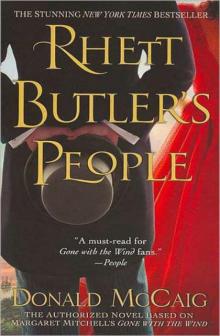 Rhett Butler's People
Rhett Butler's People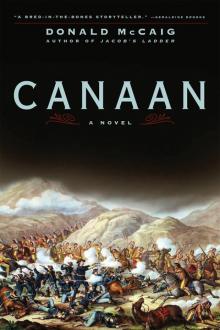 Canaan
Canaan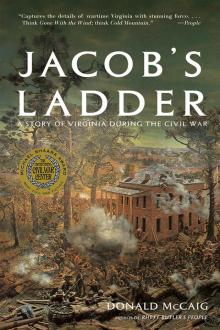 Jacob's Ladder: A Story of Virginia During the War
Jacob's Ladder: A Story of Virginia During the War Nop's Hope
Nop's Hope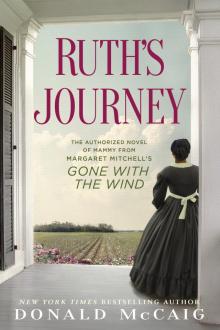 Ruth's Journey: The Authorized Novel of Mammy From Margaret Mitchell's Gone With the Wind
Ruth's Journey: The Authorized Novel of Mammy From Margaret Mitchell's Gone With the Wind Nop's Trials
Nop's Trials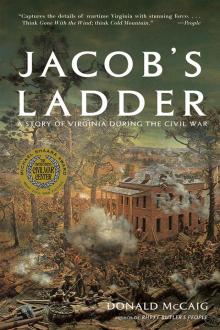 Jacob's Ladder
Jacob's Ladder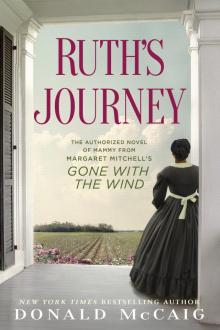 Ruth’s Journey
Ruth’s Journey Eminent Dogs, Dangerous Men
Eminent Dogs, Dangerous Men